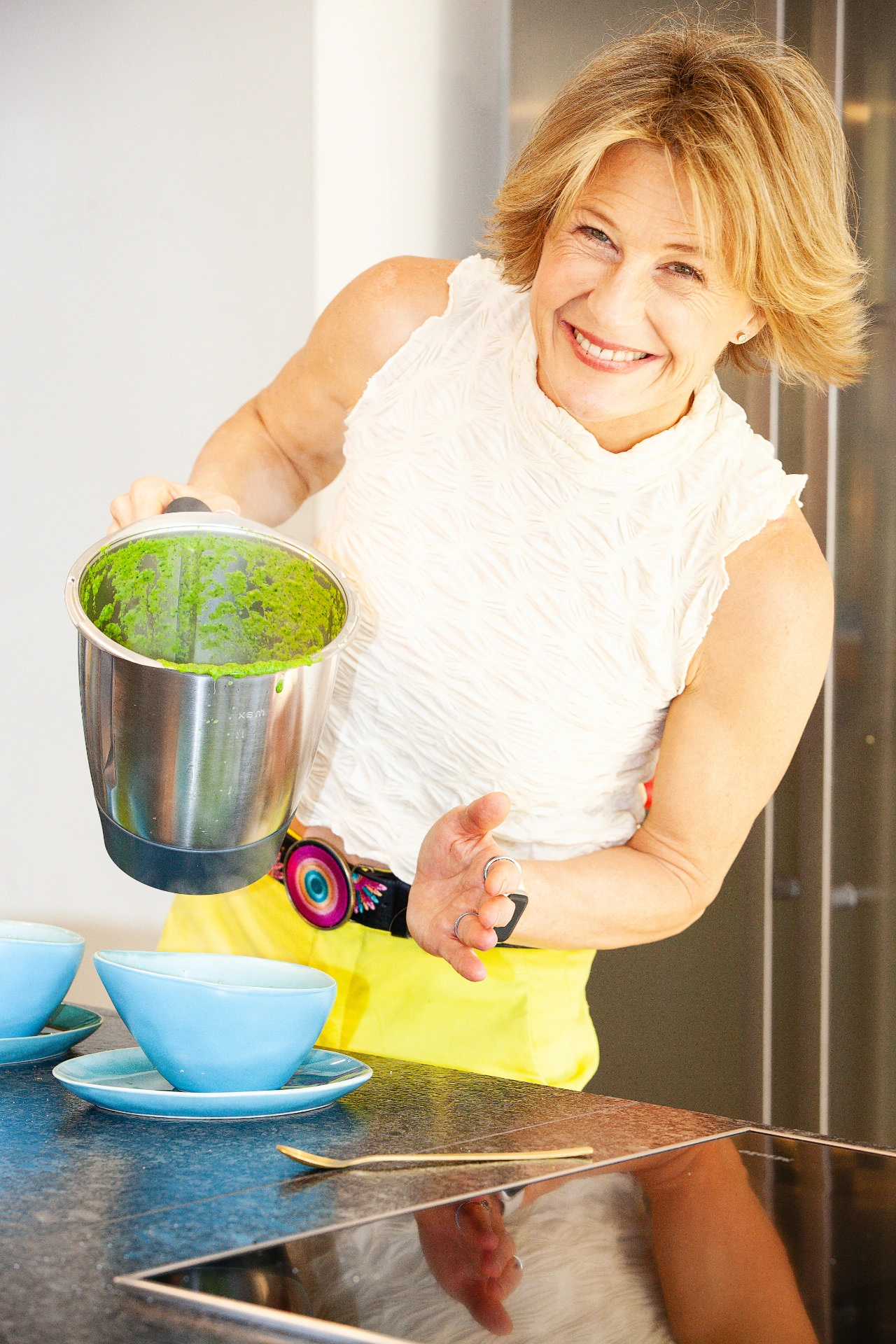
Week one of the menstrual cycle is when the bleed occurs. This can leave us feeling tired but is also a time when we are losing iron, B12 and folic acid with menstrual blood.
In addition, many women suffer with cramping and pain around this time.
What to eat
IRON rich foods, such as kale, spinach, eggs, dark chocolate, sunflower seeds, pumpkin seeds, cashew nuts, sardines, red lentils, sesame seeds, small amounts of lean red meat, chicken, flaxseeds and quinoa.
Make sure you have some vitamin C with your iron rich foods as this has been shown to increase our absorption of iron. Include vitamin C rich foods such as bell peppers, tomatoes or broccoli and add in some fruits such as blueberries or kiwi.
There might be a reason why you are craving chocolate!
Surprisingly, dark chocolate (over 70%) as well as cacao nibs are a great source of iron (around 12g/100g). The recommended daily amount of iron is 14.8mg daily, so if you are craving chocolate, this might be why! Cacao is also a fantastic source of magnesium which is a natural relaxant.
We also need extra vitamins B12 and Folate to build healthy new red blood cells after the menstrual losses.
I tend to use methylcobalamin for B12 in my clinics as this is the active form of B12 and is often better absorbed. Some brands have a sublingual B12 or a B12 spray which can be good as these forms can be absorbed easily in the cheek or under the tongue. If you follow a plant-based diet, it is important to supplement the diet with a good quality B12 vitamin supplement. Some nutritional yeast products are also supplemented with vitamin B12.
Eat foods that are known to have inflammatory foods properties
Try to eat the most colourful plants you can find. Opt for red onion, purple sprouting broccoli, green kale, red apples or blueberries. Ginger, turmeric, garlic and pineapple are also believed to have anti-inflammatory properties.
Oily fish such as mackerel, sardines or salmon contain omega 3 fatty acids that are known to inhibit an enzyme called COX that produces prostaglandins. Prostaglandins are made in the uterus lining and trigger the uterine muscles to contract, which may also lead to pain or cramping.”
- Eating leaner proteins, lower in saturated fats can be beneficial during our periods as they help us to feel fuller for longer and can keep our hormones on a more even keel by regulating blood sugar more effectively. Opt for eggs, fish, chicken, beans, lentils, tofu, lean red meat, plain yogurt, some cheeses and seeds at this time at every meal and snack.
- Even though your body is crying out for sugar………
We naturally crave more sugar and carbohydrates in the week before and during our period. Rather than give in to the ice cream and cakes, your body is probably asking for healthy whole food carbohydrates such as sweet potato, quinoa, wholegrain rice, parsnips, porridge oats or pumpernickel bread.
Don’t deprive yourself of healthier carbohydrate choices at this time as they are also rich in B vitamins and fibre.
- Constipation? Lots of women find themselves more constipated than normal just before and sometimes during their period. If this sounds like you, try the following:
- Add flaxseeds and chia seeds to your breakfast.
- Try to eat 2 kiwi fruits a day.
- Increase high fibre foods such as avocado, beans and lentils, tofu, oats, barley, dried figs, prunes, apricots, apples, pears, Brussels sprouts, sweet potato, parsnips, broccoli, cabbage, turnips, carrots, psyllium husk, raspberries, nuts and seeds.
- Eat some wholegrains with your meals
- Drink at least 2 litres of water
One of my favourite tips is to grind chia and flaxseeds together in a blender and add 2 tablespoons to your yogurt or porridge. This adds an instant 10g fibre to your day!
Eating 2 kiwi fruits a day with their skin for constipation might be a good idea. Research has shown that eating 2 kiwi fruits daily for 4 weeks increased frequency and reduced transit time. Another study showed that the kiwi resulted in softer, bulkier stools.
Foods to reduce or avoid
- Sugar, while you may experience a quick energy spike, the mood and energy crash afterwards means it is only short lived.
- Processed foods are high in calories, saturated fats and simple sugars and are a poor source of nutrients and fibre. Most processed foods make us feel more tired in the long run and do not nourish our body in the same way as fresh foods. Skip the pizza and takeaways.
- Simple carbs. Most carbohydrates get quickly processed into sugars which can lead to the same peaks and troughs as if we have eaten sugar. Try to avoid the ‘white’ refined carbs found in supermarket bread, pasta, rice, crisps, bakery goods and breakfast cereals. Switch to whole food carbs that have been minimally processed.
Try swapping your baked potato for a sweet potato or half a baked butternut squash instead. I almost guarantee it will make you feel better!
- Alcohol can lead to dehydration and make symptoms worse. This is a time for slowing down a little and giving the liver a rest!
About the Author, Dominique Ludwig, Nutritionist MSc and Nutritional Therapist mBANT
Dominique Ludwig is an accomplished Nutritionist MSc., and Nutritional Therapist who is also BANT, CNHC and AFMCP accredited. Dominique works in numerous health conditions using a personalised nutrition approach.She specialises in her signature group programmes Renew Reset Recharge® programme and The Triple 30 Plan and runs a busy clinic in the heart of the South Downs where she works with her private clients as a Nutritional Therapy Practitioner, offering personalised Renew Reset Recharge® appointments.Dominique is also a double award-winning nutritionist. Dominique has over 30 years’ experience as a King’s College, London qualified Nutritionist and almost 20 years as a registered Nutritional Therapist.
Dominique works with many high-profile and A-list clients, known and respected for her discretion, expertise, and trustworthiness. Dominique works out of her own busy practice, Dominique Ludwig Nutrition Limited, in Hampshire as well as Meyer Clinic in Chichester. Dominique has helped over a thousand clients, globally, live healthier lives. She is a regular contributor to The Times, The Sunday Times and Times 2, Sheerluxe, Top Sante and many other magazines and podcasts.
DISCLAIMER:
Features published by Dominique Ludwig are not intended to treat, diagnose, cure or prevent any disease. Always seek the advice of your GP or another qualified healthcare provider for any questions you have regarding a medical condition, and before undertaking any diet, exercise or other health-related programme. Please refer to our Terms and Conditions and Medical Disclaimer for more information as well as our Webiste Terms and Conditions.





